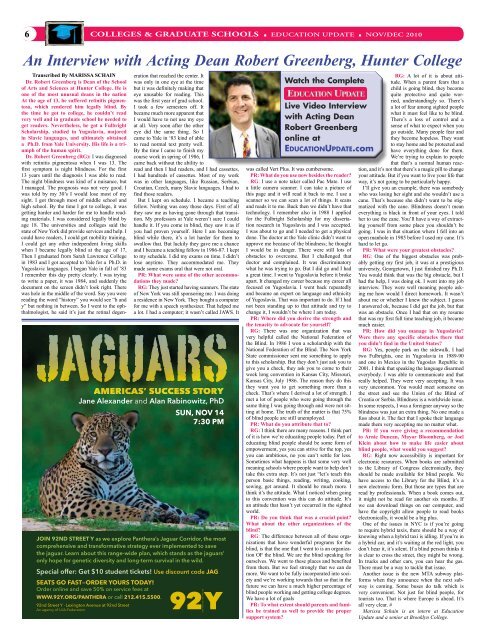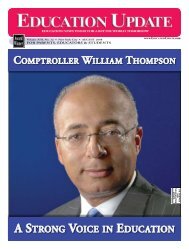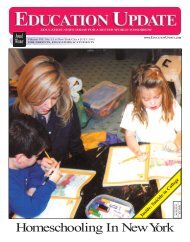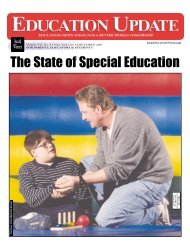Download PDF - Education Update
Download PDF - Education Update
Download PDF - Education Update
Create successful ePaper yourself
Turn your PDF publications into a flip-book with our unique Google optimized e-Paper software.
6 COLLEGES & GRADuate Schools ■ EDUCATION UPDATE ■ NOV/DEC 2010An Interview with Acting Dean Robert Greenberg, Hunter CollegeJAGUARSAMERICAS’ SUCCESS STORYJane Alexander and Alan Rabinowitz, PhDJOIN 92ND STREET Y as we explore Panthera’s Jaguar Corridor, the mostcomprehensive and transformative strategy ever implemented to savethe jaguar. Learn about this range-wide plan, which stands as the jaguars’only hope for genetic diversity and long-term survival in the wild.Special offer: Get $10 student tickets! Use discount code JAGSEATS GO FAST—ORDER YOURS TODAY!Order online and save 50% on service fees atWWW.92Y.ORG/PANTHERA or call 212.415.5500.92nd Street Y · Lexington Avenue at 92nd StreetAn agency of UJA-FederationTranscribed by Marissa SchainDr. Robert Greenberg is Dean of the Schoolof Arts and Sciences at Hunter College. He isone of the most unusual deans in the nationAt the age of 13, he suffered retinitis pigmentosa,which rendered him legally blind. Bythe time he got to college, he couldn’t readvery well and in graduate school he needed toget readers. Nevertheless, he got a FulbrightScholarship, studied in Yugoslavia, majoredin Slavic languages, and ultimately obtaineda Ph.D. from Yale University. His life is a triumphof the human spirit.Dr. Robert Greenberg (RG): I was diagnosedwith retinitis pigmentosa when I was 13. Thefirst symptom is night blindness. For the first13 years until the diagnosis I was able to read.The night blindness was kind of a nuisance, butI managed. The prognosis was not very good. Iwas told by my 30’s I would lose most of mysight. I got through most of middle school andhigh school. By the time I got to college, it wasgetting harder and harder for me to handle readingmaterials. I was considered legally blind byage 18. The universities and colleges said thestate of New York did provide services and help. Icould have readers, I could get mobility training,I could get any other independent living skillswhen I became legally blind at the age of 17,Then I graduated from Sarah Lawrence Collegein 1983 and I got accepted to Yale for a Ph.D. inYugoslavic languages. I began Yale in fall of ’83I remember this day pretty clearly. I was tryingto write a paper, it was 1984, and suddenly thedocument on the screen didn’t look right. Therewas hole in the middle of the word. Say you werereading the word “history” you would see “h andy” but nothing in between. So I went to the ophthalmologist,he said it’s just the retinal degenerationthat reached the center. Itwas only in one eye at the timebut it was definitely making thateye unusable for reading. Thiswas the first year of grad school.I took a few semesters off. Itbecame much more apparent thatI would have to not use my eyeat all. Very soon after the othereye did the same thing. So Icame to Yale in ‘83 kind of ableto read normal text pretty well.By the time I came to finish mycourse work in spring of 1986, Icame back without the ability toread and then I had readers, and I had cassettes,I had hundreds of cassettes. Most of my workwas in other languages, like Russian, Serbian,Croatian, Czech, many Slavic languages. I had tofind those readers.But I kept on schedule. I became a teachingfellow. Nothing was easy those days. First of allthey saw me as having gone through that transition.My professors at Yale weren’t sure I couldhandle it. If you come in blind, they saw it as ifyou had proven yourself. Here I am becomingblind while there, it’s a lot harder for them toswallow that. But luckily they gave me a chanceand I became a teaching fellow in 1986-87. I keptto my schedule. I did my exams on time. I didn’tlose anytime. They accommodated me. Theymade some exams oral that were not oral.PR: What were some of the other accommodationsthey made?RG: They just started having scanners. The stateof New York was still sponsoring me. I was doinga residence in New York. They bought a computerfor me with a speech synthesizer. That helped mea lot. I had a computer; it wasn’t called JAWS. ItSUN, NOV 147:30 PMPhoto: Steve WinterWatch the CompleteLive Video Interviewwith Acting DeanRobert Greenbergonline at<strong>Education</strong><strong>Update</strong>.comwas called Vert Plus. It was cumbersome.PR: What do you use now besides the reader?RG: I use a note taker called Pac Mate. I usea little camera scanner. I can take a picture ofthis page and it will read it back to me. I use ascanner so we can scan a lot of things. It scansand reads it to me. Back then we didn’t have thattechnology. I remember also in 1988 I appliedfor the Fulbright Scholarship for my dissertationresearch in Yugoslavia and I was accepted.I was about to go and I needed to get a physicaldone. The doctor at the Yale clinic didn’t want toapprove me because of the blindness; he thoughtI would be in danger. There were still lots ofobstacles to overcome. But I challenged thatdoctor and complained. It was discriminatorywhat he was trying to go. But I did go and I hada great time. I went to Yugoslavia before it brokeapart. It changed my career because my career allfocused on Yugoslavia. I went back repeatedlyand became an expert on language and ethnicityof Yugoslavia. That was important to do. If I hadnot been standing up to that attitude and try tochange it, I wouldn’t be where I am today.PR: Where did you derive the strength andthe tenacity to advocate for yourself?RG: There was one organization that wasvery helpful called the National Federation ofthe Blind. In 1986 I won a scholarship with theNational Federation of the Blind. The New YorkState commissioner sent me something to applyto this scholarship. But they don’t just ask you togive you a check, they ask you to come to theirweek long convention in Kansas City, Missouri,Kansas City, July 1986. The reason they do thisthey want you to get something more than acheck. That’s where I derived a lot of strength. Imet a lot of people who were going through thesame thing I was going through and were not sittingat home. The truth of the matter is that 75%of blind people are still unemployed.PR: What do you attribute that to?RG: I think there are many reasons. I think partof it is how we’re educating people today. Part ofeducating blind people should be some form ofempowerment, yes you can strive for the top, yesyou can ambitious, no you can’t settle for less.Sometimes what happens is that some very wellmeaning schools where people want to help don’ttake this extra step. It’s not just “let’s teach thisperson basic things, reading, writing, cooking,sewing, get around. It should be much more. Ithink it’s the attitude. What I noticed when goingto this convention was this can do attitude. It’san attitude that hasn’t yet occurred in the sightedworld.PR: Do you think that was a crucial point?What about the other organizations of theblind?RG: The difference between all of these organizationsthat have wonderful programs for theblind, is that the one that I went to is an organizationOF the blind. We are the blind speaking forourselves. We went to these places and benefitedfrom them. But we feel strongly that we can domore. We want to be fully incorporated into societyand we’re working towards that so that in thefuture we can have a much higher percentage ofblind people working and getting college degrees.We have a lot of goalsPR: To what extent should parents and familiesbe trained as well to provide the propersupport system?RG: A lot of it is about attitude.When a parent fears that achild is going blind, they becomequite protective and quite worried,understandingly so. There’sa lot of fear among sighted peoplewhat it must feel like to be blind.There’s a loss of control and asense of what to expect when yougo outside. Many people fear andthey become hopeless. They wantto stay home and be protected andhave everything done for them.We’re trying to explain to peoplethat that’s a normal human reaction,and it’s not that there’s a magic pill to changeyour attitude. But if you want to live your life thatway, it’s not going to be particularly happy.I’ll give you an example, there was somebodywho was losing her sight and she wouldn’t use acane. That’s because she didn’t want to be stigmatizedwith the cane. Blindness doesn’t meaneverything is black in front of your eyes. I toldher to use the cane. You’ll have a way of extractingyourself from some place you shouldn’t begoing. I was in that situation where I fell into anopen manhole in 1985 before I used my cane. It’shard to let go.PR: What were your greatest obstacles?RG: One of the biggest obstacles was probablygetting my first job, it was at a prestigiousuniversity, Georgetown, I just finished my Ph.D.You would think that was the big obstacle, but Ihad the help, I was doing ok. I went into my jobinterview. They were well meaning people askingme how would I direct homework. It wasn’tabout me or whether I knew the subject. I guessI answered ok, because I did get the job, but thatwas an obstacle. Once I had that on my resumethat was my first full time teaching job, it becamemuch easier.PR: How did you manage in Yugoslavia?Were there any specific obstacles there thatyou didn’t find in the United States?RG: Yes, people park on the sidewalk. I hadtwo Fulbrights, one in Yugoslavia in 1989-90and one in Mexico in the Yugoslav Republic in2001. I think that speaking the language disarmedeverybody. I was able to communicate and thatreally helped. They were very accepting. It wasvery uncommon. You would meet someone onthe street and see the Union of the Blind ofCroatia or Serbia. Blindness is a worldwide issue.In some respects, I was a foreigner anyway so theblindness was just an extra thing. No one made afuss about it. The fact that I spoke their languagemade them very accepting me no matter what.PR: If you were giving a recommendationto Arnie Duncan, Mayor Bloomberg, or JoelKlein about how to make life easier aboutblind people, what would you suggest?RG: Right now accessibility is important forelectronic resources. When books are submittedto the Library of Congress electronically, theyshould be made available for blind people. Wehave access to the Library for the Blind, it’s anew electronic form. But those are types that areread by professionals. When a book comes out,it might not be read for another six months. Ifwe can download things on our computer, andhave the copyright allow people to read bookselectronically, it would be a big plus.One of the issues in NYC is if you’re goingto require hybrid taxis, there should be a way ofknowing when a hybrid taxi is idling. If you’re ina hybrid car, and it’s waiting at the red light, youdon’t hear it, it’s silent. If a blind person thinks itis clear to cross the street, they might be wrong.In trucks and other cars, you can hear the gas.There must be a way to tackle that issue.Another issue is the new MTA subway platformswhen they announce when the next subwayis coming. Some buses do talk which isvery convenient. Not just for blind people, fortourists too. That is where Europe is ahead. It’sall very clear. #Marissa Schain is an intern at <strong>Education</strong><strong>Update</strong> and a senior at Brooklyn College.
















